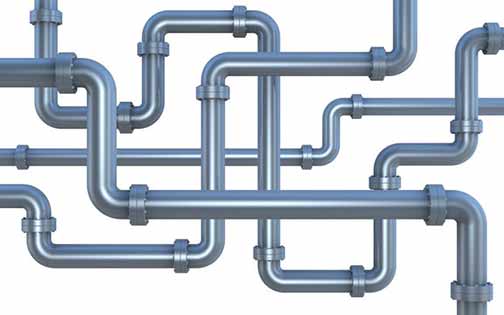
The plumbing systems in buildings are similar to the city streets and highways that cars travel on. Newly-built highways are immaculate and great fun to drive on. But if they are not cleaned and maintained properly, dirt will accumulate, and potholes will form, warns Shannon Management team.
If those potholes are not fixed, they become craters, making the road impassable. The same thing happens to the plumbing pipes in homes and offices. When the plumbing is new, its performance is top-level. Plumbing pipes must be cleaned and maintained regularly to retain their function.
If this is not done, debris will build up inside the pipes until the pipe channel is blocked. At the same time, the plumbing system will start to slowly fall apart as aging, corrosion, and other issues tear the structure apart. With time, water will be unable to flow through the pipes.
The above scenario is why most plumbing systems don’t last as long as they should. The manufacturer of the pipes and components estimates that the plumbing will last a certain number of years. But your plumbing can only last long if it is properly maintained.
How should you maintain the pipes in your plumbing to ensure their function and longevity? In this post, we explain the top plumbing maintenance tips from experts. These tips will keep your pipes flowing and help your plumbing system last longer than its projected lifespan.
Professional tips for prolonging the life of plumbing pipes
Do not use chemical drain cleaners
Chemical drain cleaners are cheap, fast, and convenient. But what you save in the short term by using these products is not worth the trouble of fixing the damage they will cause to your pipes. Chemical drain cleaners contain corrosives that will destroy your pipes. They are best avoided.
Annually inspect pipes
Problems in your plumbing will not warn you before they happen, but often, those problems start as small issues. By inspecting the plumbing, you can catch the warning signs of the problem before it becomes something major. Plan to have your plumbing professionally inspected at least once a year.
Use enzymatic drain-cleaners
Enzyme drain cleaners are safe because they only eat the edible debris inside your pipes. They love to eat grease but will not attack the material in your plumbing. However, enzyme drain cleaners will not work against hair and non-edible debris, so combine them with other safe methods.
Schedule annual drain-cleaning
Professional drain cleaning, using methods like hydro jetting and sewer rodding, is the best way to get rid of the debris that has built up inside your pipes. Hydro jetting and sewer rodding will remove grease and dislodge tree roots. Hydro jetting will go one extra step to wash the debris out of your pipes.
Use pipe insulation
Insulating exposed water pipes in your home will protect them from freezing weather and help prevent frozen and burst pipes. The cost of insulating your water pipes pales in significance to the cost and inconvenience of dealing with water damage in your home. You also ensure an uninterrupted water supply during winter.
Install drain screens or strainers
The best way to keep your drains flowing all the time is to keep debris out of the pipes. Drain screens and strainers help keep debris out of your drains. Installing a drain strainer in the bathroom will help to keep hair and soap scum out of your drainage system. When installing these devices, ensure they are the right size and clean.
Watch what you flush
To prevent clogs and blockages, you should only flush human waste, toilet paper, and water into your toilet. Do not be tempted to dump other items into the toilet, even if they are labeled as flushable. Things like flushable cat litter and wipes will only clog your drainpipes.
Check and maintain water pressure
Excessively high water pressure is a major cause of plumbing pipe damage. High water pressure will expose your pipes and appliances to too much stress, resulting in cracks, leaks, and other problems. If you have had water pressure issues, install a pressure-regulating valve to protect your plumbing.
Use corrosion inhibitors
These are chemicals that help slow or stop the corrosion process in plumbing pipes. They work by forming a protective coating on the surface of the pipe, preventing access to corrosive substances or disputing the processes that lead to corrosion. A professional plumber can advise on the right corrosion inhibitor for your plumbing.
Create a maintenance schedule
You should not wait until there are problems in your plumbing before maintaining the system. Instead, you want to have the system on a schedule, even without signs of trouble. This preventive maintenance will let you detect problems early and solve them cheaply.
Lastly, the above steps work best if you have an experienced plumber working with you. A professional plumber will see problems you don’t see, and they can show you ways to future-proof your plumbing by making strategic upgrades to the system.